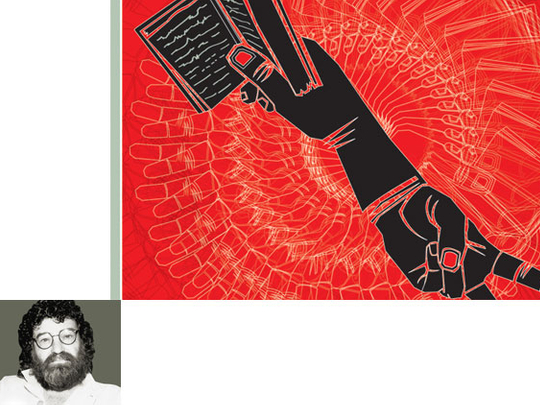
United States Judge Billing L. Hand, a much quoted judicial philosopher who wrote prolifically on constitutional law in the 1920s, had something to say that may be of great relevance to the Arab Spring and Arab activists engaged in seeking a way to the clearing for their long suffering societies. “I often wonder whether we do not rest our hopes too much upon constitutions, upon laws and upon courts”, Hand said. “These are false hopes. Believe me, these are false hopes. Liberty lies in the hearts of men and women. When it dies there, no constitution, no law, no court can save it.”
If the anniversary of a historical event is often a time for reflection, then so be it on this, the second anniversary of the Arab Spring. From Tunisia to Libya, Egypt to Syria, Palestine to Lebanon and elsewhere in the Arab world, profound change is taking place before our eyes. The impression, at first blush, is that Arabs will — yet again — fail the challenges of modernity. In short, the impression is that those radical movements that spearheaded the struggle and promised liberation from the constraints of the old order have now poisoned the well of the Arab peoples’ self-confidence in their future.
In Tunisia, there are daily confrontations between teeming crowds of the urban unemployed and the authorities. In Libya, armed militias remain a law unto themselves in many parts of the country. In Egypt, societal polarisation is evinced by the spectacle of tens of thousands of opponents and supporters of the newly-elected government slugging it out daily in Tahrir Square and outside the presidential palace. In Syria, where the rebels have yet to come together as a united front, the deadly conflict drags on without end, gradually spilling over into Lebanon — a nation with enough social contradictions of its own. And in Palestine, the “Islamists” in Gaza and the “secularists” in the West Bank remain estranged, as the former get a cheap thrill out of declaring their recent confrontation with Israel a “great victory” and the latter celebrate their “major achievement” at having the United Nations declare Palestine an “observer state”.
Elsewhere, in countries in the Middle East and North Africa, from Jordan to Morocco, there is sullen disenchantment and alienation. All of which is casting doubt on the ability of Arab society to renew itself and solve its problems.
Fine, that is the bad news — the bad news that cultural pessimists love to ferret out and bandy about. The good news is that revolutionary change is always accompanied by inevitable turmoil (it happens in the life of nations as in the life of individuals) simply because a revolution, effectively the substitution of the old order for one that is freshly minted, tries to fill a gap in the idiom of the human experience. And that comes the hard way. The additional good news is that, to paraphrase Alexis de Tocqueville in his commentary on the French Revolution, people will endure economic hardship, social injustice, even colonial subjugation so long as it all seemed beyond redress, but once they glimpse the possibility of removing the shadow of oppression in their lives, there is no going back to the status quo ante. Like Martin Luther King, they have been to the mountain.
The Arab Spring is here to stay. If progressive Islam — not just as a religious faith, but also as a social ideology, a cultural sensibility and a view of the world — finally takes root as a self-defining vehicle in our world, what is there to bicker about here? Progressive Islam has grown out of the very bosom of our history. For centuries it spoke to us, about us, from us. Our very being was embodied within its very verbal canvas. You could no more condemn Islam for the excesses of those who functioned in its name, all the way from Afghanistan to Mali and from 9/11 to Fort Hood, than you could condemn Christianity for the brutalities of the Inquisition, the Crusades and the witch hunts. Or, for that matter, condemn Jeffersonian principles for the outrageous practices of Joe McCarthy and the House Un-American Activities Committee (HUAC) in the 1950s.
Arabs have tried, and tried again and again, to embrace secular ideologies imported from the West, such as Socialism, Baathism, Nasserism and John Lockian liberalism, but these have failed them. And the common man found them, when juxtaposed against his indigenous paradigm, as difficult to decipher and relate to, as mute, as incomprehensible, like hieroglyphics at an Egyptian tomb.
In modern Arab history, from Jamal Al Din Al Afghani to Izz Al Din Al Qassam, it was leaders armed with Islamic dicta who led the masses to revolt. It was in Islam, in other words, not in the borrowed dress of alien ideologies, where Arabs felt, if only teleologically, that their historical ethos would strike root. Islam and Arabs have emerged in close-knit reciprocity and Islam in the Arab world belongs not just to Muslims as a religion but also to Christians as a culture.
So what, I ask again, is the bickering all about? To those Egyptians concerned bout “too Islamic” a constitution, I say that for constitutional law to have meaning, it must be not just the words in it that we rattle off, but the words we live by. Were he with us today, Billing L. Hand would nod.
Fawaz Turki is a journalist, lecturer and author based in Washington. He is the author of The Disinherited: Journal of a Palestinian Exile.












